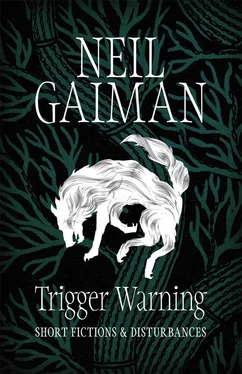Neil Gaiman - Trigger Warning - Short Fictions and Disturbances
Здесь есть возможность читать онлайн «Neil Gaiman - Trigger Warning - Short Fictions and Disturbances» весь текст электронной книги совершенно бесплатно (целиком полную версию без сокращений). В некоторых случаях можно слушать аудио, скачать через торрент в формате fb2 и присутствует краткое содержание. Год выпуска: 2015, Издательство: Headline, Жанр: Старинная литература, на английском языке. Описание произведения, (предисловие) а так же отзывы посетителей доступны на портале библиотеки ЛибКат.
- Название:Trigger Warning: Short Fictions and Disturbances
- Автор:
- Издательство:Headline
- Жанр:
- Год:2015
- ISBN:нет данных
- Рейтинг книги:4 / 5. Голосов: 1
-
Избранное:Добавить в избранное
- Отзывы:
-
Ваша оценка:
- 80
- 1
- 2
- 3
- 4
- 5
Trigger Warning: Short Fictions and Disturbances: краткое содержание, описание и аннотация
Предлагаем к чтению аннотацию, описание, краткое содержание или предисловие (зависит от того, что написал сам автор книги «Trigger Warning: Short Fictions and Disturbances»). Если вы не нашли необходимую информацию о книге — напишите в комментариях, мы постараемся отыскать её.
Trigger Warning: Short Fictions and Disturbances — читать онлайн бесплатно полную книгу (весь текст) целиком
Ниже представлен текст книги, разбитый по страницам. Система сохранения места последней прочитанной страницы, позволяет с удобством читать онлайн бесплатно книгу «Trigger Warning: Short Fictions and Disturbances», без необходимости каждый раз заново искать на чём Вы остановились. Поставьте закладку, и сможете в любой момент перейти на страницу, на которой закончили чтение.
Интервал:
Закладка:
Eloise saw it, and she did not worry that she had gone mad. She got up stiffly and walked into the house. Her reflection in the mirror shocked her, as it always did these days. Her hair so thin, so sparse, her face so gaunt.
She picked up the papers from the table beside her makeshift bed: a letter from her oncologist was on the top, beneath it a dozen pages of numbers and words. There were more papers beneath it, all with the hospital logo on the top of the first page. She picked them up and, for good measure, she picked up the hospital bills as well. Insurance covered so much of it, but not all.
She walked back outside, pausing in the kitchen to catch her breath.
The brazier waited, and she threw her medical information into the flames. She watched them brown and blacken and turn to ash on the November wind.
Eloise got up, when the last of the medical records had burned away, and she walked inside. The mirror in the hall showed her an Eloise both familiar and new: she had thick brown hair, and she smiled at herself from the looking glass as if she loved life and trailed comfort in her wake.
Eloise went to the hall closet. There was a red hat on the shelf she could barely remember, but she put it on, worried that the red might make her face look washed out and sallow. She looked in the mirror. She appeared just fine. She tipped the hat at a jauntier angle.
Outside the last of the smoke from the black snake-wound brazier drifted on the chilly November air.
December Tale
Summer on the streets is hard, but you can sleep in a park in the summer without dying from the cold. Winter is different. Winter can be lethal. And even if it isn’t, the cold still takes you as its special homeless friend, and it insinuates itself into every part of your life.
Donna had learned from the old hands. The trick, they told her, is to sleep wherever you can during the day – the Circle line is good, buy a ticket and ride all day, snoozing in the carriage, and so are the kinds of cheap cafés where they don’t mind an eighteen-year-old girl spending fifty pence on a cup of tea and then dozing off in a corner for an hour or three, as long as she looks more or less respectable – but to keep moving at night, when the temperatures plummet, and the warm places close their doors, and lock them, and turn off the lights.
It was nine at night and Donna was walking. She kept to well-lit areas, and she wasn’t ashamed to ask for money. Not any more. People could always say no, and mostly they did.
There was nothing familiar about the woman on the street corner. If there had been, Donna wouldn’t have approached her. It was her nightmare, someone from Biddenden seeing her like this: the shame, and the fear that they’d tell her mum (who never said much, who only said ‘good riddance’ when she heard Gran had died) and then her mum would tell her dad, and he might just come down here and look for her, and try to bring her home. And that would break her. She didn’t ever want to see him again.
The woman on the corner had stopped, puzzled, and was looking around as if she was lost. Lost people were sometimes good for change, if you could tell them the way to where they wanted to go.
Donna stepped closer, and said, ‘Spare any change?’
The woman looked down at her. And then the expression on her face changed and she looked like . . . Donna understood the cliché then, understood why people would say She looked like she had seen a ghost . She did. The woman said, ‘ You? ’
‘Me?’ said Donna. If she had recognised the woman she might have backed away, she might even have run off, but she didn’t know her. The woman looked a little like Donna’s mum, but kinder, softer, plump where Donna’s mum was pinched. It was hard to see what she really looked like because she was wearing thick black winter clothes, and a thick woollen bobble hat, but her hair beneath the hat was as orange as Donna’s own.
The woman said, ‘Donna.’ Donna would have run then, but she didn’t, she stayed where she was because it was just too crazy, too unlikely, too ridiculous for words.
The woman said, ‘Oh god. Donna. You are you, aren’t you? I remember.’ Then she stopped. She seemed to be blinking back tears.
Donna looked at the woman, as an unlikely, ridiculous idea filled her head, and she said, ‘Are you who I think you are?’
The woman nodded. ‘I’m you,’ she said. ‘Or I will be. One day. I was walking this way remembering what it was like back when I . . . when you . . .’ Again she stopped. ‘Listen. It won’t be like this for you forever. Or even for very long. Just don’t do anything stupid. And don’t do anything permanent. I promise it will be all right. Like the YouTube videos, you know? It Gets Better. ’
‘What’s a you tube?’ asked Donna.
‘Oh, lovey,’ said the woman. And she put her arms around Donna and pulled her close and held her tight.
‘Will you take me home with you?’ asked Donna.
‘I can’t,’ said the woman. ‘Home isn’t there for you yet. You haven’t met any of the people who are going to help you get off the street, or help you get a job. You haven’t met the person who’s going to turn out to be your partner. And you’ll both make a place that’s safe, for each other and for your children. Somewhere warm.’
Donna felt the anger rising inside her. ‘Why are you telling me this?’ she asked.
‘So you know it gets better. To give you hope.’
Donna stepped back. ‘I don’t want hope,’ she said. ‘I want somewhere warm. I want a home. I want it now. Not in twenty years.’
A hurt expression on the placid face. ‘It’s sooner than twen—’
‘I don’t care ! It’s not tonight. I don’t have anywhere to go. And I’m cold . Have you got any change?’
The woman nodded. ‘Here,’ she said. She opened her purse and took out a twenty-pound note. Donna took it, but the money didn’t look like any currency she was familiar with. She looked back at the woman to ask her something, but she was gone, and when Donna looked back at her hand, so was the money.
She stood there shivering. The money was gone, if it had ever been there. But she had kept one thing: she knew it would all work out someday. In the end. And she knew that she didn’t need to do anything stupid. She didn’t have to buy one last Underground ticket just to be able to jump down onto the tracks when she saw a train coming, too close to stop.
The winter wind was bitter, and it bit her and it cut her to the bone, but still, she spotted something blown up against a shop doorway, and she reached down and picked it up: a five-pound note. Perhaps tomorrow would be easier. She didn’t have to do any of the things she had imagined herself doing.
December could be lethal, when you were out on the streets. But not this year. Not tonight.
The Case of Death and Honey
It was a mystery in those parts for years what had happened to the old white ghost man, the barbarian with his huge shoulder-bag. There were some who supposed him to have been murdered, and, later, they dug up the floor of Old Gao’s little shack high on the hillside, looking for treasure, but they found nothing but ash and fire-blackened tin trays.
This was after Old Gao himself had vanished, you understand, and before his son came back from Lijiang to take over the beehives on the hill.
***
This is the problem, wrote Holmes in 1899 : Ennui. And lack of interest. Or rather, it all becomes too easy. When the joy of solving crimes is the challenge, the possibility that you cannot, why then the crimes have something to hold your attention. But when each crime is soluble, and so easily soluble at that, why then there is no point in solving them.
Читать дальшеИнтервал:
Закладка:
Похожие книги на «Trigger Warning: Short Fictions and Disturbances»
Представляем Вашему вниманию похожие книги на «Trigger Warning: Short Fictions and Disturbances» списком для выбора. Мы отобрали схожую по названию и смыслу литературу в надежде предоставить читателям больше вариантов отыскать новые, интересные, ещё непрочитанные произведения.
Обсуждение, отзывы о книге «Trigger Warning: Short Fictions and Disturbances» и просто собственные мнения читателей. Оставьте ваши комментарии, напишите, что Вы думаете о произведении, его смысле или главных героях. Укажите что конкретно понравилось, а что нет, и почему Вы так считаете.







